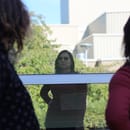There aren’t many coming of age movies about young women that are not centered around “a boy.” So, it’s not a surprise that Lady Bird, directed by Greta Gerwig, has garnered such praise and renown for its story and composition. Lady Bird won best Motion Picture – Musical or Comedy, and Saoirse Ronan won Best Actress in a Motion Picture – Musical or Comedy. I have high hopes for Oscar nominations, specifically for Greta Gerwig as Best Director. Lady Bird tells the story of Christine McPherson (Saoirse Ronan), who self-identifies as Lady Bird, and her endeavour to go to a university out of state. Set in Lady Bird’s last year of high school, the plot consists of her relationships with friends, romantic encounters, and, most importantly, her relationship with her mother as she bridges the divide between being a teenager and a young adult.
What’s so exceptional about Lady Bird is how Ronan plays her character. Lady Bird is in a constant state of flux between insecurity and confidence, and it’s Ronan’s phenomenal acting that makes us believe her motivations, because she has so many layers. Her fearless drive to be who she wants to be and go after her goals is inspiring. Ronan’s acting engaged me on such a level that, the more I watched Lady Bird, the more I identified with her. I remember being 17 and struggling for independence, cycling through friends, and finding my identity. Her relationship with her friends and her family spoke volumes to my own experiences, and seeing an authentic young woman’s coming of age story was refreshing.
Another unique aspect of this film is its use of cinematography. The story relies on quick cuts from shot to shot that, when done well, creates a sense of urgency and momentum that carries you through a story without feeling weighed down. Another way that Lady Bird keeps the story light is through its use of humour that permeates throughout the whole film. Gerwig, who also wrote the script, economically condensed the story to a runtime of 1 hour and 34 minutes where each scene works to move the story forward at a furious pace. This fits the theme of the graduation year and being a teenager: there is too much time, and also not nearly enough to encompass your experience of growing up.
This unique way of editing the film also allowed for emotionally charged scenes to be heavy hitting. The scenes where we are shown a vulnerable moment in a character’s life help you realize how little you know about other people’s lives, how deeply intricate other people’s lives are outside of our own, and the importance of the small moments in life. Watching Lady Bird was almost a nostalgic experience because, as I saw Lady Bird’s mistakes and her sorrows, I was reliving mine, and it created this very real empathy for this character because she was me and I was her. I watched this film in a packed theatre and, as the film progressed, you could feel the space fill with the audience’s compassion and joy for Lady Bird and her story. When she goes to university, she’s hit with the realization that everyone has when they go to university: you don’t know as much as you think you know. You begin to learn what’s really important to you, and you begin the process of settling into your own skin.
As a writing student, I have heard the line, “specificity is the best universality.” This seems counterintuitive as, when one attempts to make something relatable, one naturally thinks, “Okay, make it general and nonspecific so that people can make of it what they will and add their own story.” In practice, the opposite is true. Precision in characterization, plot, and setting creates an environment that relays a definitive emotional situation where the audience recognizes the context and direction the story is going. Even if it’s something that has never happened in their lives event for event , audience members are able to recognize the motivations and humanity of the characters, which allows them to empathize. Lady Bird is a prime example of this concept, and the script’s careful cultivation of what the audience sees allows for great pacing and flow.
Maybe not everyone would see themselves in this movie. However, I would argue that this is a movie that everyone should see, because it takes something real and reaches out to the audience through the story and the characters and asks to be heard and understood. It doesn’t glorify youth as being tragic or idyllic, but portrays it as an earnest, naive part of people’s lives when they are on the cusp of finally reaching the point where they can do what they want, and be who they want. In a world where we focus so much on the big picture, we can forget about the triumphs of everyday life and the importance of the small moments we all live. So, I urge you to go see Lady Bird, because it’s necessary to laugh and experience the heart of life.


